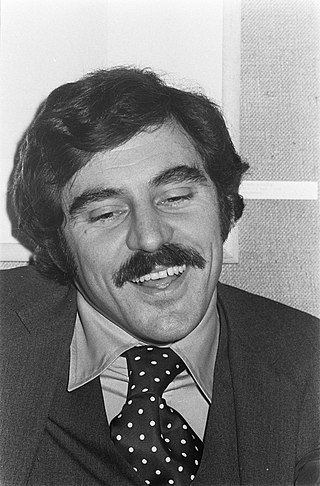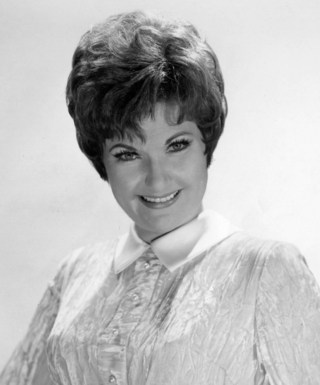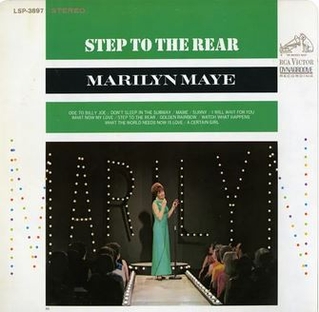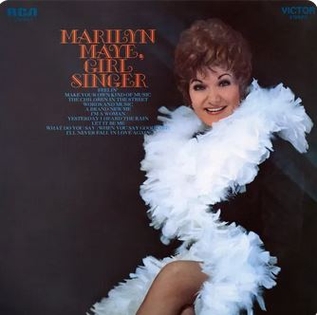
Columbia Records is an American record label owned by Sony Music Entertainment, a subsidiary of Sony Corporation of America, the North American division of Japanese conglomerate Sony. It was founded on January 15, 1889, evolving from the American Graphophone Company, the successor to the Volta Graphophone Company. Columbia is the oldest surviving brand name in the recorded sound business, and the second major company to produce records. From 1961 to 1991, its recordings were released outside North America under the name CBS Records to avoid confusion with EMI's Columbia Graphophone Company. Columbia is one of Sony Music's four flagship record labels: Epic Records, and former longtime rivals, RCA Records and Arista Records as the latter two were originally owned by BMG before its 2008 relaunch after Sony's acquisition alongside other BMG labels.
RCA Records is an American record label owned by Sony Music Entertainment, a subsidiary of Sony Corporation of America.

MGM Records was a record label founded by the Metro-Goldwyn-Mayer film studio in 1946 for the purpose of releasing soundtrack recordings of their musical films. It transitioned into a pop music label that continued into the 1970s. The company also released soundtrack albums of the music for some of their non-musical films as well, and on rare occasions, cast albums of off-Broadway musicals such as The Fantasticks and the 1954 revival of The Threepenny Opera. In one instance, MGM Records released the highly successful soundtrack album of a film made by another studio, Columbia Pictures's Born Free (1966).

Anthony Newley was an English actor, singer, songwriter, and filmmaker. A "latter-day British Al Jolson", he achieved widespread success in song, and on stage and screen. "One of Broadway's greatest leading men", from 1959 to 1962 he scored a dozen entries on the UK Top 40 chart, including two number one hits. Newley won the 1963 Grammy Award for Song of the Year for "What Kind of Fool Am I?", sung by Sammy Davis Jr., and wrote "Feeling Good", which became a signature hit for Nina Simone. His songs have been sung by a wide variety of singers including Fiona Apple, Tony Bennett, Barbra Streisand, Michael Bublé and Mariah Carey.

Urban Clifford "Urbie" Green was an American jazz trombonist who toured with Woody Herman, Gene Krupa, Jan Savitt, and Frankie Carle. He played on over 250 recordings and released more than two dozen albums as a soloist. He was inducted into the Alabama Jazz Hall of Fame in 1995.
"Glad to Be Unhappy" is a popular song composed by Richard Rodgers, with lyrics by Lorenz Hart. It was introduced in their 1936 musical On Your Toes, sung by Doris Carson and David Morris, although it was not popular at the time, as there was only one recording of the song. In the 1937 London production, it was sung by Gina Malo and Eddie Pola. The song was performed in the 1954 Broadway revival by Kay Coulter and Joshua Shelley.
"You're Gonna Hear from Me" is a song written by André Previn and Dory Previn written for the 1965 movie Inside Daisy Clover and performed, among others, by Andy Williams. The song reached No. 13 on the adult contemporary chart in 1966.

Marilyn Maye McLaughlin is an American singer, musical theater actress and masterclass educator. With a career spanning eight decades, Maye has performed music in the styles of cabaret, jazz and pop music. She has received one nomination from the Grammy Awards and had commercial success as a recording artist.

"On a Clear Day (You Can See Forever)" is a song written by Burton Lane (music) and Alan Jay Lerner (lyrics) for the 1965 Broadway musical On a Clear Day You Can See Forever. It was subsequently performed by American actress and vocalist Barbra Streisand in the 1970 film adaptation of the musical.
Joseph P. Lippman was an American composer, arranger, conductor, pianist, and songwriter working in jazz and traditional pop. His musical career was over five decades long, having started at age 19 with the Benny Goodman orchestra in 1934 and writing for television, films, and Broadway in the 1980s. He composed and arranged for Bunny Berigan, Jimmy Dorsey, Sarah Vaughan, Charlie Parker and worked as staff arranger in television for Perry Como and Hollywood Palace.

The discography of American singer Marilyn Maye contains 13 studio albums, two compilation albums, two live albums, 13 lead artist singles, two promotional singles and four additional album appearances. Her debut studio album appeared in 1961 called Marilyn...the Most. Signing with RCA Victor, her second studio album was released in 1965 titled Meet Marvelous Marilyn Maye. It was followed in 1966 by the live album, The Second of Maye, and a studio album, The Lamp Is Low.

Meet Marvelous Marilyn Maye is a studio album by American singer Marilyn Maye. It was released in August 1965 via RCA Victor and contained 12 tracks. It was the second album of Maye's career and her first with the RCA label. It contained songs from musicals and also featured covers of jazz vocal standards. It was reviewed positively by Billboard magazine following its release in 1965.

The Lamp Is Low is a studio album by American singer Marilyn Maye. It was released in October 1966 via RCA Victor and contained 12 tracks. The album was a mixture of both original material and cover songs. Of its cover songs were recordings from 1960s films and jazz standards. Among its Jazz tracks was the album's title track. It received positive reviews from Billboard and Cashbox magazines. The album has been considered a "classic" disc since its original release.
"Sherry!" is a song composed by James Lipton and Laurence Rosenthal. It was first recorded in 1966 by American singer Marilyn Maye whose version was released as a single by RCA Victor. It later appeared in the Broadway musical also titled Sherry!. The show premiered in 1967, however, it was never recorded until 2004. "Sherry!" was then recorded for the cast album by American television actress Carol Burnett.

A Taste of "Sherry!" is a studio album by American singer Marilyn Maye. It was released in February 1967 by RCA Victor and contained 12 tracks. The album featured Maye's first commercially successful singles: "Cabaret" and "Sherry". Both were featured in Broadway musicals of the same names and both reached the top ten on the American adult contemporary chart. A Taste of "Sherry!" received positive reviews from several publications following its release.
"Step to the Rear" is a song written by Elmer Bernstein and Carolyn Leigh. It was originally performed in the Broadway musical How Now, Dow Jones between 1967 and 1968. It was first recorded on an official cast album in 1968. It was notably recorded by American singer Marilyn Maye, whose version was released as a single. Maye's version reached the top five of the American adult contemporary chart and was seen on televised advertisements for Lincoln and Mercury cars. It was adapted into the University of South Carolina’s fight song as The Fighting Gamecocks Lead the Way.

Step to the Rear is a studio album by American singer Marilyn Maye. It was released in November 1967 via RCA Victor and contained 11 tracks. Its title song was taken from the Broadway musical How Now Dow Jones and was a single for Maye in 1967. It reached the top five of American adult contemporary chart. The album itself received a positive review from Billboard magazine following its release.

The Happiest Sound in Town is a studio album by American singer Marilyn Maye. It was released in September 1968 via RCA Victor and contained 11 tracks. It was the sixth studio album of Maye's career featuring songs that were categorized as easy listening material. It featured cover of popular recordings along with new material.

Marilyn Maye, Girl Singer is a studio album by American singer Marilyn Maye. It was released in April 1970 via RCA Victor and was the seventh studio album of her career. It was also her final album released by RCA Victor. Girl Singer contained a total of 11 tracks. Two tracks were originally singles. The 1968 single "Feelin'" became a top 20 song on the American adult contemporary chart. Girl Singer was given a positive review from Record World magazine following its release.













